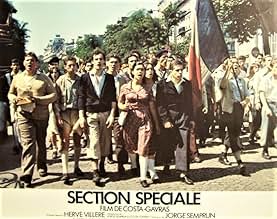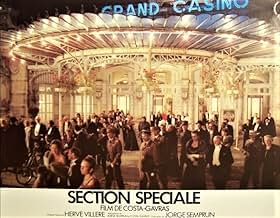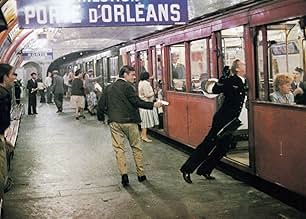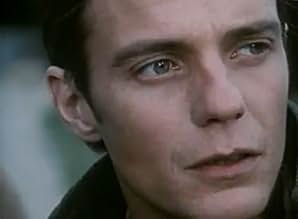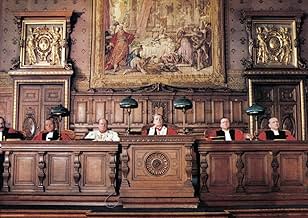AVALIAÇÃO DA IMDb
7,6/10
1,7 mil
SUA AVALIAÇÃO
Na França ocupada durante a Segunda Guerra Mundial, um oficial alemão é assassinado. O governo colaboracionista de Vichy decide responsabilizar seis pequenos criminosos. Juízes leais são cha... Ler tudoNa França ocupada durante a Segunda Guerra Mundial, um oficial alemão é assassinado. O governo colaboracionista de Vichy decide responsabilizar seis pequenos criminosos. Juízes leais são chamados para condená-los o mais rápido possível.Na França ocupada durante a Segunda Guerra Mundial, um oficial alemão é assassinado. O governo colaboracionista de Vichy decide responsabilizar seis pequenos criminosos. Juízes leais são chamados para condená-los o mais rápido possível.
- Prêmios
- 2 vitórias e 2 indicações no total
Michael Lonsdale
- Pierre Pucheu, le ministre de l'Intérieur
- (as Michel Lonsdale)
- Direção
- Roteiristas
- Elenco e equipe completos
- Produção, bilheteria e muito mais no IMDbPro
Enredo
Você sabia?
- CuriosidadesBased on a true story.
- Erros de gravaçãoWhen two of the judges have lunch on a restaurant patio, two members of the French Milice, wearing the gamma insignia, are sitting at a table behind. The action is set in summer 1941 but the Milice, subordinated to the French government in Vichy was created in January 1943.
- ConexõesReferenced in Roma Armada (1976)
Avaliação em destaque
Although perhaps not quite on the same level as director Costa-Gavras' other scathing critiques of the abuse of power, this still has a great deal to recommend it in terms of its superlative adaptation from the novel of Hervé Villeré by Jorge Semprún and a cast comprising some of France's most distinguished actors. It lacks of course the 'star' attraction of Yves Montand and if you blink you will miss his uncredited appearance as a soup-eating militiaman. The overall pacing is measured but Gavras' regular editor Francois Bonnet maintains the momentum whilst the excellent score is by Eric de Marsan whose music had contributed so much to Melville's earlier 'L'Armée des Ombres'.
During the trial of Marechal Philippe Pétain the prosecutor referred to the 'Exceptional Courts' as 'a monstrous institution', a description which no decent human being would dispute. Following the shooting of a German midshipman in the Barbes-Rochechouart Métro by a Communist activist who would later achieve renown as Colonel Fabien, the Nazis had threatened to execute an hundred French hostages, regardless of rank or celebrity. Ostensibly to save French lives and appease his German masters, Pétain instigated the 'section spéciale' to pass sentence of death on a handful of token prisoners classed as 'undesirables' who had previously been given lighter sentences for minor crimes. It only remained to appoint the judges whose major qualifications were ambition, amorality, cowardice or a combination thereof.
This utterly grotesque situation lends itself to the blackest of humour and Gavras does not fall short in this regard, not least in the executioners hanging around the court impatiently awaiting the names of those they are to guillotine. What is most effective however is how the legislative charade and parody of justice are carried out with the most proper ceremony. As Michel Benon, president of the Special Court, Claude Piéplu again excels as the man you love to hate.
Although the film ends by informing us that none of the judges faced sanctions for their activities in fact the Minister of Justice at the time, Joseph Barthélemy, superbly played by veteran Louis Séigner, was tried by the High Court but died of cancer before the end of legal proceedings. The egregious Minister of the Interior, Pierre Pucheu, a chilling portrayal here by Michel Lonsdale, was destined, ironically, to be sentenced by a Special Court and executed by firing squad.
There is some justice after all.
During the trial of Marechal Philippe Pétain the prosecutor referred to the 'Exceptional Courts' as 'a monstrous institution', a description which no decent human being would dispute. Following the shooting of a German midshipman in the Barbes-Rochechouart Métro by a Communist activist who would later achieve renown as Colonel Fabien, the Nazis had threatened to execute an hundred French hostages, regardless of rank or celebrity. Ostensibly to save French lives and appease his German masters, Pétain instigated the 'section spéciale' to pass sentence of death on a handful of token prisoners classed as 'undesirables' who had previously been given lighter sentences for minor crimes. It only remained to appoint the judges whose major qualifications were ambition, amorality, cowardice or a combination thereof.
This utterly grotesque situation lends itself to the blackest of humour and Gavras does not fall short in this regard, not least in the executioners hanging around the court impatiently awaiting the names of those they are to guillotine. What is most effective however is how the legislative charade and parody of justice are carried out with the most proper ceremony. As Michel Benon, president of the Special Court, Claude Piéplu again excels as the man you love to hate.
Although the film ends by informing us that none of the judges faced sanctions for their activities in fact the Minister of Justice at the time, Joseph Barthélemy, superbly played by veteran Louis Séigner, was tried by the High Court but died of cancer before the end of legal proceedings. The egregious Minister of the Interior, Pierre Pucheu, a chilling portrayal here by Michel Lonsdale, was destined, ironically, to be sentenced by a Special Court and executed by firing squad.
There is some justice after all.
- brogmiller
- 10 de mai. de 2024
- Link permanente
Principais escolhas
Faça login para avaliar e ver a lista de recomendações personalizadas
- How long is Special Section?Fornecido pela Alexa
Detalhes
- Tempo de duração1 hora 58 minutos
- Mixagem de som
- Proporção
- 1.66 : 1
Contribua para esta página
Sugerir uma alteração ou adicionar conteúdo ausente

Principal brecha
By what name was Sessão Especial de Justiça (1975) officially released in India in English?
Responda
